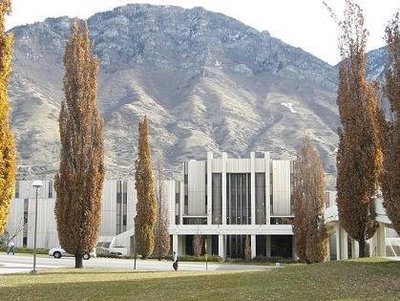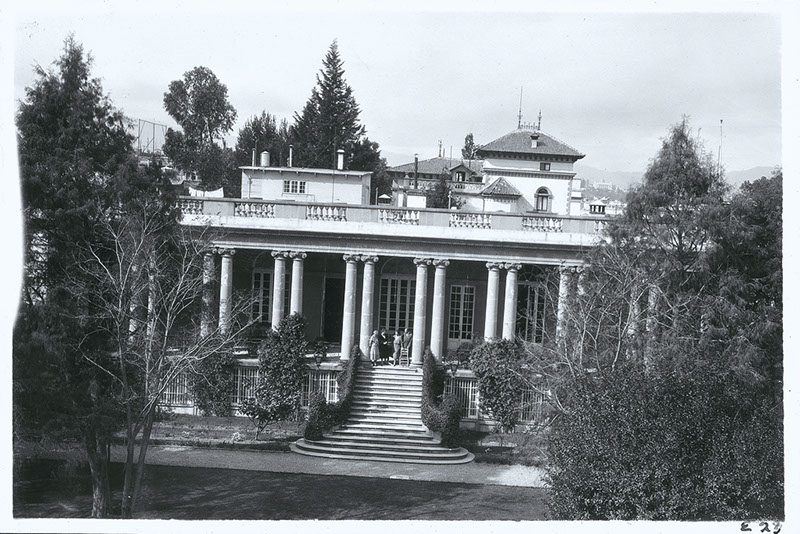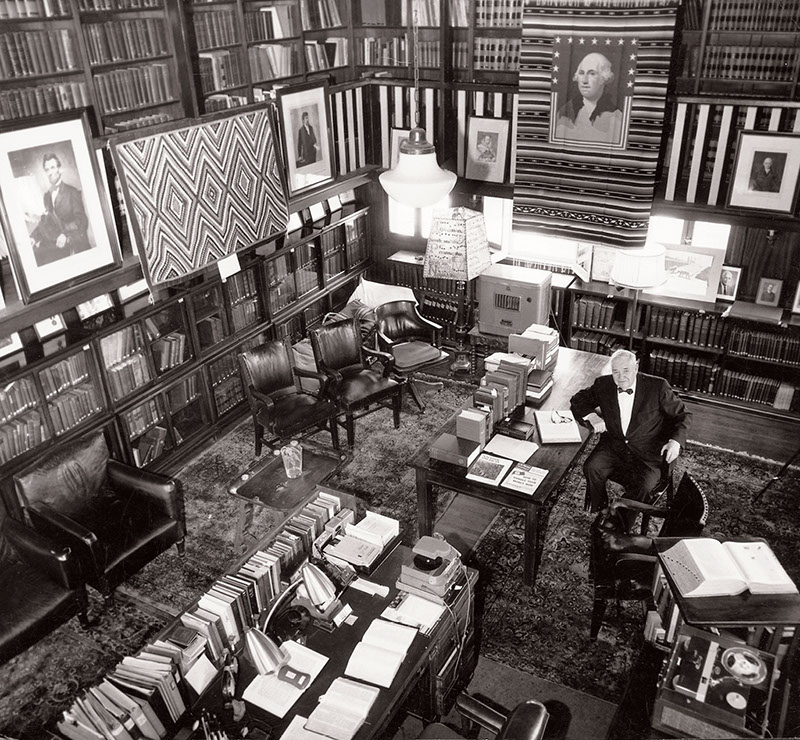On March 9, 1971, Harold B. Lee, president of The Church of Jesus Christ of Latter-day Saints and Chairman of the Church Board of Education, officially announced that Brigham Young University would establish a law school. However, the J. Reuben Clark School of Law project had been in process for quite some time prior to the announcement.
Brigham Young University started down the path of creating a law school as early as 1899 when a Provo, Utah, attorney offered to donate his personal library of 200 books and start a two year program to help students prepare to take the bar exam.[1] George Brimhall, acting president of then Brigham Young Academy took the proposal to the board of trustees, and the proposal was authorized. For reasons unknown, this particular plan was never carried out.[2]
 Year later, in 1949, LDS Attorney Clyde Sandgren of New York proposed that he and other like-minded attorneys advocate for the creation of a law school to the board of trustees. One of those like-minded attorneys was Ernest L. Wilkinson. At the time he was practicing law in Washington and would become president of Brigham Young University the next year.
Year later, in 1949, LDS Attorney Clyde Sandgren of New York proposed that he and other like-minded attorneys advocate for the creation of a law school to the board of trustees. One of those like-minded attorneys was Ernest L. Wilkinson. At the time he was practicing law in Washington and would become president of Brigham Young University the next year.
President Wilkinson’s new position would seem to have put him in an ideal position to push for the law school. However, he presided over Brigham Young University’s biggest period of growth in its history, with the student body expanding from 5,000 to 25,000 in the twenty years he served as president.[3] Further changes included the tremendous proliferation of new construction on the growing campus and the establishment of a separate and distinct ecclesiastical structure within the campus to accommodate the needs of so many additional students without creating undue burden on local ecclesiastical leadership. As a result, it was not until 1971, the last year of President Wilkinson’s tenure as president of Brigham Young University, that he was able to finalize plans for the establishment of the law school.
President Wilkinson’s advocacy coincided with an elevated level of interest in the prospects of a law school from a prominent leader in the Mormon Church, Marion G. Romney. Romney had served under President J. Reuben Clark for many years in church leadership. A former attorney himself, he considered President Clark something of a mentor both as a church leader and a professional. He had consulted previously with President Clark and President Wilkinson about the prospects for a law school, but it was not until nearly ten years after President Clark’s death in 1961 that the green light was given to pursue the school.
President Clark had recently passed away, and the memory of both his ecclesiastical service and professional excellence were cherished by Marion G. Romney and President Wilkinson. Naming the school for a respected LDS attorney seemed a natural choice.
 In 1970 and together with announcing the impending resignation of President Wilkinson as Brigham Young University President, Prophet Harold B. Lee announced plans for the establishment of the law school. In his remarks can be heard the influence of President Wilkinson’s leadership and competence as part of what brought the law school to fruition.
In 1970 and together with announcing the impending resignation of President Wilkinson as Brigham Young University President, Prophet Harold B. Lee announced plans for the establishment of the law school. In his remarks can be heard the influence of President Wilkinson’s leadership and competence as part of what brought the law school to fruition.
President Lee discussed the admirable manner in which President Wilkinson guided the university’s growth. Apart from noting that growth and the challenges presented, he credited President Wilkinson for keeping the university relatively stable and free of turmoil during the turbulent decade of the sixties.[4]
Additionally, he made reference to President Wilkinson’s professional aptitude and mentioned, “As a lawyer, someone has aptly said no man can be a sound or great lawyer who is not well-read in the laws of Moses. And that to me has been one of the anchor things in the life and practice of President Wilkinson.”
“Because of [President Wilkinson’s] great stature in the field of law, we discussed plans which had previously been approved by the University Board of Trustees to establish the J. Reuben Clark College of Law at Brigham Young University.”
Also in those remarks, President Lee gave indications as to the rationale for establishing a law school at a unique faith-based institution such as Brigham Young University. Again nodding to the influence of President Wilkinson and also the legacy of the law school’s future, President Lee referred to J. Reuben Clark, Jr. as one of the greatest lawyers of our time, well-versed in international and constitutional law, and that President Lee knew of perhaps no more ardent students of the constitution than both President Clark and President Wilkinson.[5]
President Lee expressed his desires about the destiny of the law school at Brigham Young University thus:
“This church has looked upon the constitution as the Lord has revealed as framed by men whom God raised up for this very purpose. Where else but on this campus should be concerned about having a school of law where we can train lawyers who will defend the Constitution of the United States?”
“If we can train lawyers who are soundly based in the Constitution it will be a long step forward to send out into the world who will take their place in defending the foundation of this United States of America.”
 Surely the inspiring career of President Clark, “one of the greatest lawyers of [his] time” would inspire law students to similarly revere and uphold the Constitution and to pursue equally honorable careers in the field of law.
Surely the inspiring career of President Clark, “one of the greatest lawyers of [his] time” would inspire law students to similarly revere and uphold the Constitution and to pursue equally honorable careers in the field of law.
Said President Wilkinson:
“I hope that it will be just as different and distinctive from other law schools as Brigham Young University is distinctive and different from other universities…. I hope that it will be a law school that will have as its foundation the divinity of Christianity, dedication to the Constitution of the United States, allegiance to the concepts of free agency, and the belief in the nobility and integrity of man as an individual not as a creature of the state.”
These ideals are perfectly in line with the life and service of J. Reuben Clark. Addressing the first class of students in the newly established J. Reuben Clark School of Law on August 23, 1973, President Dallin H. Oaks said,
“Persons who knew President J. Reuben Clark, Jr. need not ask why this law school carries his name. But few who knew him personally will study here. Members of this entering class were ten to fifteen years old at the time of his death. We must therefore introduce successive generations of students to the great man whose name will be associated with their professional qualifications, so that his ideals and accomplishments can influence their lives.
“J. Reuben Clark was a widely acclaimed authority in international and constitutional law, a distinguished public servant, an eminent author, a wise counselor, and a servant of the Lord. His coherent philosophy of law and government was born of brilliance and nurtured by superior education, experience, love of country, and devotion to God. Men with his combination of brilliance, wisdom, and faith are all too rare, and we do well to seek their acquaintance.
“The life of J. Reuben Clark exemplifies the excellence of mind and character we seek to foster in the law school that now bears his name. Every person—and especially every young student of the law—can identify with the life of this great man and appropriately aspire to the greatness he attained.”[6]
Today, the tradition of scholarly excellence, in the name of J. Reuben Clark, continues at Brigham Young University’s College of Law.
[1] http://lawalumni.byu.edu/s/1085/06-law/index.aspx?sid=1085&gid=8&pgid=252&cid=6794&ecid=6794&crid=0&calpgid=61&calcid=2483
[2] Id.
[3] Bennett, Richard E. “Brigham Young University” in Arnold K. Garr, et. al, eds., Encyclopedia of Latter-day Saint History. (Salt Lake City: Deseret Book, 2000) p. 136
[5] Id.
[6] Dallin H. Oaks, Address, in Addresses at the Opening Ceremony of the J. Reuben Clark Law School 3 (Aug. 27, 1973)
